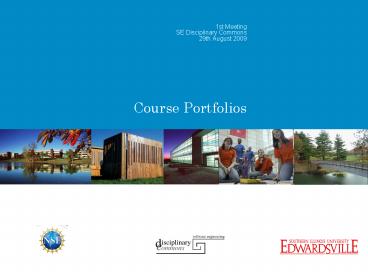Course Portfolios - PowerPoint PPT Presentation
Title:
Course Portfolios
Description:
This material is for your eyes only. A diary space for self-disclosure and reflection. ... Public: The Wide Wide World ... UK: England & Wales Creative Commons License ... – PowerPoint PPT presentation
Number of Views:77
Avg rating:3.0/5.0
Title: Course Portfolios
1
Course Portfolios
- 1st Meeting
- SE Disciplinary Commons
- 29th August 2009
2
Portfolios
- Marine Architecture
3
Portfolios
- Computer Modeling
4
Portfolios
- Photography
5
Portfolios
- Investment
6
What do they have in common?
- The purposeful selection of artifacts to achieve
an end - Selection is not random content is chosen to
reflect the parts that are most important to you
(and/or your theme) - What end? This requires consideration of audience
and purpose - Our Commons Portfolios may be quite different
from a portfolio you would compile for promotion
different audience, different purpose (or it
may be the same)
7
The Lab Report
The Journal Paper
- Title
- Hypothesis
- Materials
- Procedure
- Data
- Calculations
- Results
- Conclusions
- Title page
- Abstract
- Introduction
- Materials and Methods
- Results
- Discussion
- Literature Cited
8
The power of form
- Allows comparability
- Allows for different sorts of research, with
different emphases - Content is guaranteed by peer review
- The Journal paper is to research as
9
the Portfolio is to teaching?
- Context(or environment or place and space)
- Content
- Instructional Design
- Delivery
- Assessment
- Evaluation
- Allows comparability
- Allows for different sorts of practice, with
different emphases - Content guaranteed by the nature of the
evidence (and how it is structured) and peer
review
10
The Nature Structure of Portfolio Content
Artifact Commentary
Evidence Analysis
What Why
- Paired elements
- Nothing admissible without an evidential artifact
- Necessity of capture
11
The Portfolio?
- Common headings but how do they fit together?
- I would propose four different formats and
themes that might be useful frameworks for our
course investigations and documentation the
course as anatomical structure the natural
history of a course the ecology of courses and
courses as investigations. - Lee Shulman, "Course Anatomy The Dissection and
Analysis of Knowledge Through Teaching", in The
Course Portfolio, Hutchins, Pat (ed.), 1999.
12
The Portfolio?
- Anatomy
- parts, structure, part-part relations,
aggregations of parts, function of parts and
aggregates. - Natural History
- developmental trajectory narrative, journey,
itinerary, coherence. - Ecology
- programmatic context it's fit within the
scheme of things. - Investigation
- course as series of experiments to test learning
conjectures. What do you want to understand about
your students? - Summarized list by Josh Tenenberg
13
Developing Reflective Practice
- The Course Portfolio can be thought of as a
document that provides different levels of access
to different audiences - Private
- Protected
- Public
14
Portfolio Levels of Access
- Private The Individual Teacher - just you
- This material is for your eyes only. A diary
space for self-disclosure and reflection. - Protected The Group of Peers - a few friends
- This is material that you share with your peers.
For our purposes, we can certainly consider one
another as peers, though you might want to
consider colleagues in your department or in the
broader discipline as part of this group as well.
Sharing here is relatively safe and contained,
and will be where well draw most of our peer
reviews from.
15
Portfolio Levels of Access
- Public The Wide Wide World
- This is the material that we will post on the
Internet, for all eyes to see, the final product
that is often referred to as The Course
Portfolio. Well want to ensure that there are no
gaffes or errors, and, as a result of this being
accessed by a wider audience, we might want to
include more context and navigational aids
16
More questions
- What is your purpose?
- Personal reflection
- Promotion
- Documentation
- ???
- Implementation?
- HTML
- Word
- PPT
- ???
17
Design space for Course Portfolio
public, protected, private
Implementation
Audiences
Purpose(s)
Personal reflection Promotion Documentation
Based on David Gibson
18
Begin with the end in mind
- What is your purpose?
- Personal reflection
- Promotion
- Documentation
- ???
- Who is your audience?
- Self
- Department
- Institution
- Community
19
Begin with the end in mind
- What is your purpose?
- Personal reflection
- Promotion
- Documentation
- ???
- Who is your audience?
- Self
- Department
- Institution
- Community
20
Original Slides by Sally Fincher, University of
Kentlicensed under an Attribution-NonCommercial-S
hareAlike 2.0 UK England Wales Creative
Commons License































